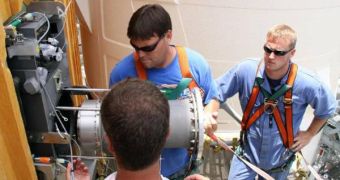In a test that took place yesterday, July 1st, at the Kennedy Space Center's Launch Pad 39A, space shuttle Endeavor's external hydrogen fuel tanks were filled to the brink with propellant, as engineers watched the troublesome valve that kept the shuttle from taking off twice with tension. But, after adding more than 526,000 gallons of fuel in the 15-story-high construct, there were no discernible leaks, and everything seemed to be performing within the expected parameters, Space informs.
This is one of the few occasions on which NASA performs such a test, but its necessity became obvious immediately after the second failed attempt at a lift-off, when liquid hydrogen sprung up from the troublesome vent line, rather than through it. This leak posed a tremendous danger to the rocket, the shuttle and the crew, as a spark would have ignited the fuel inside the tank, and would have blown up the entire pad. But it would appear that NASA engineers care about their fame, and they worked tirelessly to take the vent line apart piece by piece, and put it back together.
“We think we've got this licked. This should solve it, and the test we're doing today is to verify it before we go launch next week,” Steve Payne, the NASA test director, said during the proceedings. Candrea Thomas, a spokesperson for the American space agency, also revealed good results, adding that, “Preliminary results indicate that repairs to the ground umbilical carrier plate, or GUCP, were successful.”
“We've passed the point where we've had problems before, and once you've done that you typically don't see leaks, historically. I'd say we're cautiously optimistic at this point,” Kyle Herring, another spokesperson for NASA, told Space. Tests at the Cape Canaveral complex began at 6:48 am EDT (1100 GMT) and concluded around 9:00 am EDT (1300 GMT), when it became clear that no hydrogen was leaking.
Because of the fault, Endeavor could not launch on June 13th and 17th, and also interfered with the launch schedule for the Lunar Reconnaissance Mission (LRO), which took off a day later than scheduled, on June 18th. Still, even if the shuttle takes off on July 11th, as currently planned, controllers are not sure if the rest of the flight program for this year will be respected.

 14 DAY TRIAL //
14 DAY TRIAL //